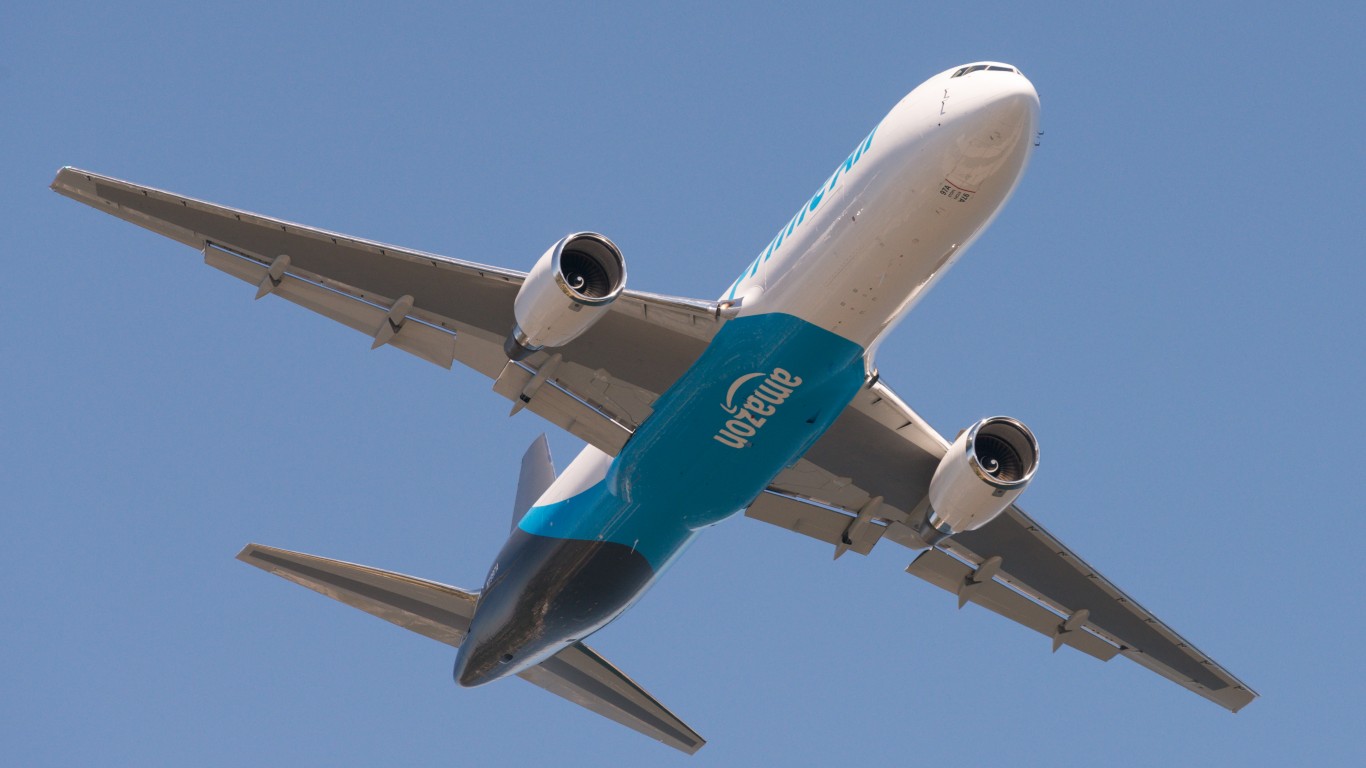
It has been such a busy week for Amazon.com Inc. (NASDAQ: AMZN) that it’s hard to decide where to start here. The share price added about 2.5% in the first four days of June, after climbing to a gain of more than 4% early Thursday morning.
Amazon’s share price had risen above $2,500 a share Thursday morning, it’s peak since posting all-time highs around $2,525 in late May. While the S&P 500 has lost about 3.7% so far in 2020, Amazon’s stock price is up just over 33%.
Perhaps Thursday’s dip came following Tesla CEO Elon Musk tweets that maybe Amazon should be broken up. Or, Musk saw an opportunity to needle Amazon CEO Jeff Bezos whose Blue Origin space travel company competes with Musk’s Space X. SpaceX completed a trip from U.S. soil to the International Space Station early in the week, and maybe Musk was crowing just a bit.
In addition to billionaire celebrity news, however, there was real news from the online retailer on several fronts.
Money’s Cheap and Amazon Scored Some of the Cheapest
Amazon issued some $9.9 billion in new debt this week. The most interesting thing is the coupon the company is paying. On $1 billion in two-year notes, Amazon is paying a coupon of 0.4%. The five-year notes are paying 0.8% on $1.25 billion in new debt, and the seven-year notes are paying 1.2% on $1.25 billion in new borrowing.
Ten-year notes for $2 billion are paying 1.5% while $2.5 billion in 30-year notes pay a coupon of 2.5% and $2 billion in 40-year notes pay 2.7%. This is as near to free money as there is. Even Apple Inc. (NASDAQ: AAPL) had to pay a higher coupon.
Apple’s two-year notes, issued about a month ago, pay a coupon of 0.75%, 35 basis points more than Amazon. On 30-year notes, Apple is paying 2.65%, which compares to Amazon’s coupon of 2.50%. Apple’s market cap is about $170 billion higher than Amazon’s, but the retail giant can borrow at cheaper rates than the tech giant.
The Amazon Air Force Is Growing Too
On Wednesday, Amazon announced that it would lease an additional 12 cargo planes from partner Air Transport Services Group. The planes are Boeing 767-300 passenger jets that have been converted into freighters. The new planes will bring Amazon Air’s fleet up to 82 aircraft after deliveries are completed next year.
Amazon Air was created in 2016 when the company renamed Amazon Prime Air and contracted with ATSG and Atlas Air Worldwide for its first 11 767-300 cargo planes. The fleet was expected to include 40 planes in total, half the number it will reach next year.
While Amazon cites the booming demand due to the COVID-19 pandemic as driving the expansion, it’s a fair bet that the company envisions longer term growth in its Fulfillment by Amazon (FBA) service for its third-party Marketplace partners. Amazon is not a charity, and it does not enter a business unless it believes it can drive revenue by doing so.
Amazon ditched its food delivery business last year when it discovered that it could not compete (and win) against Grubhub, Uber Eats and DoorDash. In April, the Wall Street Journal reported that Amazon would shut down its Amazon Shipping service, a last-mile delivery service that failed to win against entrenched competitors like UPS, FedEx and the U.S. Postal Service.
What Amazon Expects From a New Deal With Slack
In an announcement timed to coincide with Thursday’s earnings announcement from Slack Technologies Inc. (NYSE: WORK), the two companies announced a “multi-year agreement to deliver solutions for enhanced enterprise workforce collaboration.” Slack’s channel-based messaging platform is used by millions of employees in thousands of companies.
The boom in work-from-home jobs (also a result of the COVID-19 outbreak) is expected to boost demand for a range of messaging services, including audio and video. The rise in video conferencing highlighted by the soaring stock price of Zoom Communications did not escape Amazon’s notice.
In the announcement of the partnership with Slack, Amazon referred to a software development kit for Amazon Chime, a platform that “Slack will leverage [with] AWS’s [Amazon Web Services’s] proven infrastructure to deliver high-quality and reliable user experiences while eliminating the cost and complexity of maintaining its own unified communications infrastructure.”
AWS has the scale to become a formidable competitor in the video conferencing space, but it’s getting a late start. Microsoft has a competing product called Teams that it has priced aggressively to compete with Slack, and there’s a chance that Amazon’s late start can’t be overcome. Yet, the company just loaded up with $10 billion in cash and, if history is any guide, Amazon will spend as much as it needs to take a run at the leaders.
An Investment in India Also May Be in the Works
Reuters reported exclusively on Thursday that Amazon is considering acquiring an approximately 5% stake in India’s second-largest wireless company, Bharti Airtel, for around $2 billion. The news agency cited unnamed sources, one of whom said Amazon had been considering an investment to acquire as much as 10% of Bharti.
India is the last massive market available. Although Bharti is number two behind Reliance Jio in the wireless business, its customer base is around 300 million, nearly as large as the entire U.S. population.
Analysts at Jefferies think that Bharti’s share price could rise by 50% to 100% in the next three years as revenues from India’s wireless market reach $38 billion. Bharti was the country’s leading wireless provider until Reliance Jio made a dramatic push a few years ago by offering cheap data plans and free voice calling.
If the report is true, Amazon is joining other U.S. tech giants, like Facebook and Alphabet, in the race for e-commerce customers in India. Facebook was among a group of global investors who pumped $10 billion into Reliance Jio recently, and Alphabet is considering an investment in a joint venture between Vodafone and India’s Idea Cellular called Vodafone Idea.
The Average American Has No Idea How Much Money You Can Make Today (Sponsor)
The last few years made people forget how much banks and CD’s can pay. Meanwhile, interest rates have spiked and many can afford to pay you much more, but most are keeping yields low and hoping you won’t notice.
But there is good news. To win qualified customers, some accounts are paying almost 10x the national average! That’s an incredible way to keep your money safe and earn more at the same time. Our top pick for high yield savings accounts includes other benefits as well. You can earn up to 3.80% with a Checking & Savings Account today Sign up and get up to $300 with direct deposit. No account fees. FDIC Insured.
Click here to see how much more you could be earning on your savings today. It takes just a few minutes to open an account to make your money work for you.
Our top pick for high yield savings accounts includes other benefits as well. You can earn up to 4.00% with a Checking & Savings Account from Sofi. Sign up and get up to $300 with direct deposit. No account fees. FDIC Insured.
Thank you for reading! Have some feedback for us?
Contact the 24/7 Wall St. editorial team.
 24/7 Wall St.
24/7 Wall St.

